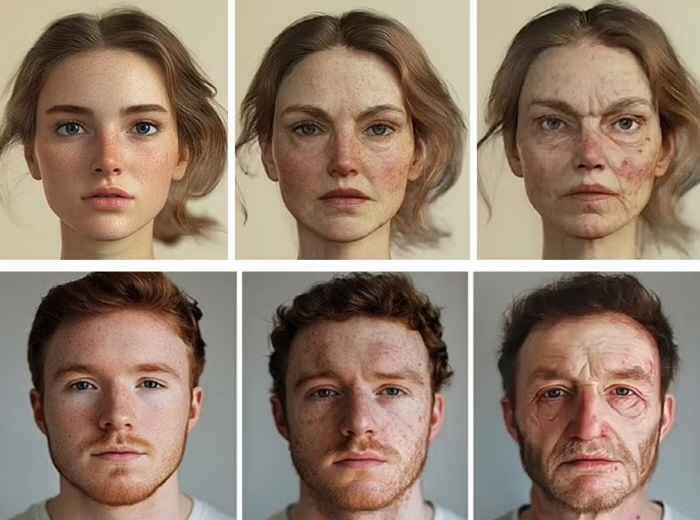Microplastic eating face changes, I predicted it with AI, and it's terrible
Apr 04, 2025
|
British recycling company 'BusinessWaste' used AI to reveal the effects microplastics can have on the skin, local media Daily Mail reported.
The company estimated how long-term exposure to low, medium, and high levels of microplastics might affect the appearance of men and women.
The results showed that exposure to low levels of microplastics through food, beverages, and daily environments interferes with hormones, causing skin dryness, redness, and irritation.
Exposure to medium-level microplastics through processed foods (stored in plastic packaging) and seafood caused more skin irritation and hormonal disturbances, which can accelerate skin aging.
In particular, hormonal disturbance associated with testosterone has been shown to increase oil production in the skin.
Businesses are also likely to live in areas with high levels of air pollution in most of these cases, which can lead to bloodshot eyes and tingling and shortness of breath, such as coughing and wheezing.
Hormonal disturbances can also lead to weight fluctuations and digestive problems.
In addition, high levels of microplastic exposure often work in industrial sites related to waste management, the synthetic fiber industry, and plastic manufacturing, including low-quality drinking water, and continued use of synthetic fibers and plastic cookware.
This resulted in more skin inflammation and signs of premature aging.
It was estimated that the skin could be discolored, inflammatory reactions such as various pouts occurred, and the tips of lips and fingers could be discolored blue or purple.
In addition, more hormonal disturbances can lead to thinning or losing hair, unexplained weight fluctuations, and irregular menstrual cycles, according to the company's researchers.
Mark Hall, a plastic waste expert who led the study, said, `We hope that people will be more interested in environmental issues through the AI images we created.'
"It is recommended to refrain from using single-use plastics and avoid nylon and polyester-based clothing as much as possible, eat organic food, reduce seafood, and switch to wooden spoons, cutting boards, and glass food containers."
This article was translated by Naver AI translator.














